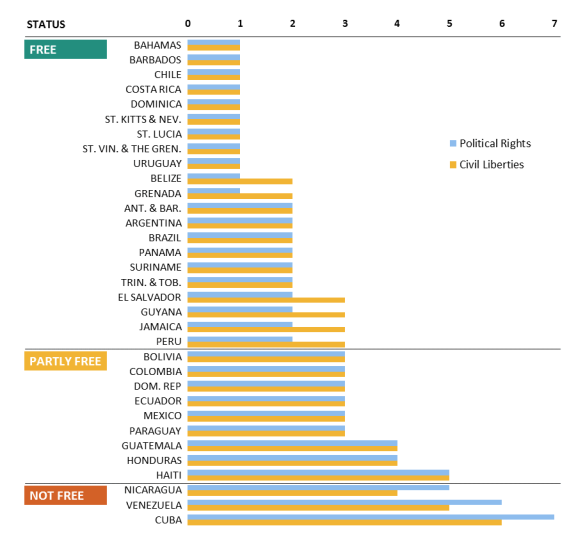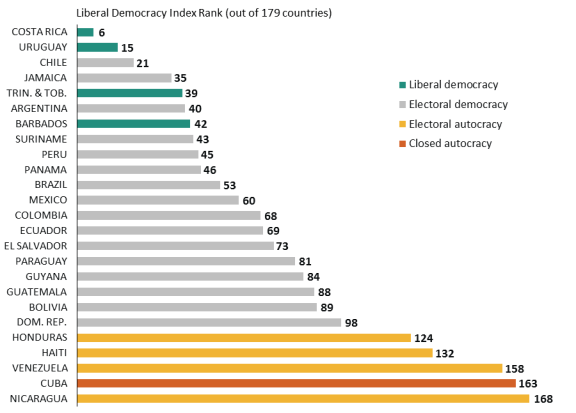Introduction
The current trajectory of democracy around the world is an issue of interest for Congress, which has contributed to U.S. democracy promotion objectives overseas. For decades, U.S. policy has broadly reflected the view that the spread of democracy around the world is favorable to U.S. interests. This report provides a regional snapshot of the political climate in Latin America and the Caribbean, based on the U.S. Department of State's description of each country's political system and selected nongovernmental (NGO) indices that measure democracy trends worldwide.
For additional information on democracy in the global context, see CRS Report R45344, Global Trends in Democracy: Background, U.S. Policy, and Issues for Congress, by Michael A. Weber.
For related information about democracy in Latin American and the Caribbean, see the following products:
- CRS In Focus IF10460, Latin America and the Caribbean: U.S. Policy Overview, by Mark P. Sullivan;
- CRS Report R45547, U.S. Foreign Assistance to Latin America and the Caribbean: FY2019 Appropriations, by Peter J. Meyer and Edward Y. Gracia;
- CRS Report 98-684, Latin America and the Caribbean: Fact Sheet on Leaders and Elections, by Carla Y. Davis-Castro; and
- CRS Report R45733, Combating Corruption in Latin America: Congressional Considerations, coordinated by June S. Beittel.
CRS also publishes reports on specific Latin American and Caribbean countries.
Source Notes
This report compiles information from the U.S. State Department and data from four nongovernmental (NGO) indices. For a discussion about definitions of democracy and critiques of democracy indices, see CRS Report R45344, Global Trends in Democracy: Background, U.S. Policy, and Issues for Congress, by Michael A. Weber. CRS does not endorse the methodology or accuracy of any particular democracy index.
In parentheses following the country name in the tables below is the nature of the country's political system, as described in the U.S. State Department's 2018 Country Reports on Human Rights Practices. While the publication focuses broadly on human rights conditions in each country, the first sentence of each country report provides a characterization of the country's political system. This U.S. government information is included here for comparison with findings from the democracy indicators published by NGOs.
Bertelsmann Stiftung, a private foundation based in Germany, has published the Bertelsmann Transformation Index (BTI) biannually since 2006. Key regional findings and country reports are available in English (BTI publishes the full regional report in German). BTI 2018 evaluates the quality of democracy, a market economy, and political management in 129 developing and transition countries. For political transformation specifically, BTI ranks countries using 18 indicators grouped into five criteria: (1) stateness, (2) political participation, (3) rule of law, (4) stability of democratic institutions, and (5) political and social integration.1 Based on the criteria, BTI assigns a category: democracy in consolidation, defective democracy, highly defective democracy, moderate autocracy, and hardline autocracy. In its regional report, BTI notes that since 2008, it "has recorded a decline in the quality of democracy in Latin America—not dramatic, but continual."2 BTI evaluates all Central and South American nations. With the exception of Cuba, the Dominican Republic, Haiti, and Jamaica, BTI does not evaluate Caribbean nations.
The Economist Intelligence Unit (EIU), based in London and New York, has offices and analysts in various countries. Since 2006, EIU has produced a democracy index that provides an annual snapshot of the state of democracy for 165 independent states and two territories.3 The EIU classifies countries as full democracies, flawed democracies, hybrid regimes, or authoritarian regimes based on an aggregate score of 60 indicators in five categories: (1) electoral process and pluralism, (2) civil liberties, (3) the functioning of government, (4) political participation, and (5) political culture. According to the EIU's Democracy Index 2018, the Latin America and Caribbean region's overall score went down from 6.26 in 2017 to 6.24 in 2018 (on a 0 to 10 scale).4 The two countries in the region classified in 2018 as full democracies are Uruguay and, new to the group, Costa Rica. EIU's Democracy Index 2018 identified three countries in the region as authoritarian regimes: Nicaragua moved to join Venezuela and Cuba.5 EIU evaluates all Central and South American nations. With the exceptions of Cuba, the Dominican Republic, Guyana, Haiti, Jamaica, Suriname, and Trinidad and Tobago, EIU does not evaluate Caribbean nations.
Freedom House is a U.S.-based NGO that conducts research on democracy, political freedom, and human rights worldwide. It has published Freedom in the World since 1978, and the current report covers 195 countries and 14 territories. Freedom House assigns each country 0 to 4 points on 25 indicators (10 political rights indicators and 15 civil liberties indicators) for a total of up to 100 points. The scores determine numerical ratings for political rights and civil liberties freedoms on a scale of 1 (most free) to 7 (least free). The political rights and civil liberties ratings are averaged to produce an overall status of free, partly free, or not free. Freedom House's report covering 2018 found that Nicaragua was the country with the greatest decline in the world regarding conditions for political rights and civil liberties as compared to 2017. Venezuela had the third-greatest decline; Brazil, El Salvador, and Guatemala also made the top 20 for steepest declines.6 The report's analysis is based on data that are detailed in full on the Freedom House web page on "Countries," which ranks the state of democracy for 197 countries and 15 territories.7 This web page lists the top three aggregate scores in Latin America and the Caribbean: Uruguay, Barbados, and Chile; the region's lowest aggregate scores are those for Nicaragua, Venezuela, and Cuba. Freedom House evaluates democracy in all Central and South American and Caribbean nations.
The Varieties of Democracy Institute (V-DEM), headquartered at the University of Gothenburg in Sweden, collects democracy data through its research team in collaboration with country experts. In 2017, V-Dem published its first global report measuring the status of democracy with an index. Democracy Report 2019 includes the Liberal Democracy Index, which examines 71 indicators included in the Liberal Component Index and the Electoral Democracy Index.8 V-Dem groups 179 countries into four categories: liberal democracy, electoral democracy, electoral autocracy, and closed autocracy. The current report notes "the regional average for Latin America is down to 0.51 in 2018, bringing the region back to about 1996-levels."9 V-DEM evaluates all Central and South American nations. With the exceptions of Barbados, Cuba, the Dominican Republic, Guyana, Haiti, Jamaica, Suriname, and Trinidad and Tobago, V-DEM does not evaluate Caribbean nations.
Table 1 looks at Caribbean countries' global democracy rankings according to EIU's Democracy Index 2018, Freedom House's Freedom in the World 2019, V-Dem's Democracy Report 2019, and Bertelsmann Stiftung's 2018 Transformation Index. Table 2 compares the same reports for Mexico and Central America, as does Table 3 for South America. Each report evaluates a different number of countries, so there are missing rankings for some countries. Countries are listed alphabetically in each table.
|
Bertelsmann Stiftung Transformation Index 2018 |
EIU Democracy Index 2018 |
Freedom House |
V-Dem Democracy Report 2019 |
|||||||
|
Country |
Political Transfor-mation Global Rank |
Status Indexa |
Global Rankb |
Regime Typec |
Aggregate Scored |
Political Rights Score |
Civil Liberties Score |
Freedom Statuse |
Liberal Democracy Index Rank |
Regime Typef |
|
Antigua & Barbuda (parliamentary multiparty democracy) |
— |
— |
— |
— |
84 |
2 |
2 |
Free |
— |
— |
|
Bahamas (constitutional parliamentary democracy) |
— |
— |
— |
— |
91 |
1 |
1 |
Free |
— |
— |
|
Barbados (parliamentary multiparty democracy) |
— |
— |
— |
— |
96 |
1 |
1 |
Free |
42 |
Liberal democracy |
|
Belize (constitutional parliamentary democracy) |
— |
— |
— |
— |
86 |
1 |
2 |
Free |
— |
— |
|
Cuba (authoritarian state) |
102 |
Hardline autocracy |
142 |
Authoritarian |
14 |
7 |
6 |
Not free |
163 |
Closed autocracy |
|
Dominica (parliamentary multiparty democracy) |
— |
— |
— |
— |
93 |
1 |
1 |
Free |
— |
— |
|
Dominican Republic (representative constitutional democracy) |
35 |
Defective democracy |
61 |
Flawed democracy |
67 |
3 |
3 |
Partly free |
98 |
Electoral democracy |
|
Grenada (parliamentary democracy) |
— |
— |
— |
— |
89 |
1 |
2 |
Free |
— |
— |
|
Guyana (multiparty democracy) |
— |
— |
54= |
Flawed democracy |
75 |
2 |
3 |
Free |
84 |
Electoral democracy |
|
Haiti (constitutional multiparty republic) |
109 |
Moderate autocracy |
102 |
Hybrid regime |
41 |
5 |
5 |
Partly free |
132 |
Electoral autocracy |
|
Jamaica (constitutional parliamentary democracy) |
15 |
Democracy in consolidation |
47= |
Flawed democracy |
78 |
2 |
3 |
Free |
35 |
Electoral democracy |
|
St. Kitts and Nevis (parliamentary multiparty democracy and federation) |
— |
— |
— |
— |
89 |
1 |
1 |
Free |
— |
— |
|
St. Lucia (parliamentary multiparty democracy) |
— |
— |
— |
— |
92 |
1 |
1 |
Free |
— |
— |
|
St. Vincent and the Grenadines (parliamentary multiparty democracy) |
— |
— |
— |
— |
91 |
1 |
1 |
Free |
— |
— |
|
Suriname (constitutional democracy) |
— |
— |
49 |
Flawed democracy |
77 |
2 |
2 |
Free |
43 |
(+) Electoral democracy |
|
Trinidad & Tobago (parliamentary democracy) |
— |
— |
43 |
Flawed democracy |
82 |
2 |
2 |
Free |
39 |
Liberal democracy |
Source: Compiled by CRS using the U.S. State Department's 2018 Country Reports on Human Rights Practices, EIU's Democracy Index 2018, Freedom House's Freedom in the World 2019, the Varieties of Democracy Institute's Democracy Report 2019, and Bertelsmann Stiftung's Transformation Index.
Notes: Although Belize is located in Central America and Guyana and Suriname are located in South America, all three are members of the Caribbean Community (CARICOM).
a. BTI classifies a country as an autocracy if one of seven political transformation indicators falls short of the relevant threshold. BTI considers failing states autocracies.
b. The symbol "=" indicates a tying score or equal rank with another country.
c. Definitions from EIU: Full democracies are countries where the "functioning of government is satisfactory. Media are independent and diverse.... effective checks and balances.... judiciary is independent and judicial decisions are enforced.... only limited problems." Flawed democracies have "free and fair elections ... basic civil liberties are respected. However, there are significant weaknesses in other aspects of democracy, including problems in governance, an underdeveloped political culture and low levels of political participation." Hybrid regimes have "substantial election irregularities.... government pressure on opposition parties and candidates.... corruption tends to be widespread and the rule of law is weak. Civil society is weak.... and the judiciary is not independent." In authoritarian regimes, "state political pluralism is absent or heavily circumscribed.... some formal institutions of democracy may exist, but these have little substance.... elections ... are not free and fair.... disregard for abuses and infringements of civil liberties.... repression of criticism of the government and pervasive censorship. There is no independent judiciary."
d. Freedom House assigns each country 0 to 4 points on 25 indicators (10 political rights indicators and 15 civil liberties indicators) for a total of up to 100 points.
e. Freedom House assigns each country a rating for political rights and one for civil liberties, where 1 represents the greatest degree of freedom and 7 the smallest degree of freedom. The average of a country's political rights and civil liberties ratings determines the status of free (1.0 to 2.5), partly free (3.0 to 5.0), or not free (5.5 to 7.0).
f. The symbol (-) indicates that, taking uncertainty into account, the country could belong to the lower category while (+) signifies that the country could belong to the higher category.
|
Bertelsmann Stiftung Transformation Index 2018 |
EIU Democracy Index 2018 |
Freedom House |
V-Dem Democracy Report 2019 |
|||||||
|
Country (U.S. State Dept. political system description) |
Political Transfor-mation Global Rank |
Status Indexa |
Global Rank |
Regime Typeb |
Aggregate Scorec |
Political Rights Score |
Civil Liberties Score |
Freedom Statusd |
Liberal Democracy Index Rank |
Regime Typee |
|
Costa Rica (constitutional republic) |
8 |
Democracy in consolidation |
20 |
Full democracy |
91 |
1 |
1 |
Free |
6 |
Liberal democracy |
|
El Salvador (constitutional multiparty republic) |
29 |
Defective democracy |
77 |
Hybrid regime |
67 |
2 |
3 |
Free |
73 |
Electoral democracy |
|
Guatemala (constitutional multiparty republic) |
74 |
Highly defective democracy |
87 |
Hybrid regime |
53 |
4 |
4 |
Partly free |
88 |
(-) Electoral democracy |
|
Honduras (constitutional multiparty republic) |
64 |
Highly defective democracy |
85 |
Hybrid regime |
46 |
4 |
4 |
Partly free |
124 |
Electoral autocracy |
|
Mexico (federal multiparty republic) |
57 |
Defective democracy |
71= |
Flawed democracy |
63 |
3 |
3 |
Partly free |
60 |
Electoral democracy |
|
Nicaraguaf (constitutional multiparty republic) |
75 |
Moderate autocracy |
122 |
Authoritarian |
32 |
5 |
4 |
Not free |
168 |
Electoral autocracy |
|
Panama (constitutional multiparty democracy) |
29 |
Defective democracy |
45 |
Flawed democracy |
84 |
2 |
2 |
Free |
46 |
(+) Electoral democracy |
Source: Compiled by the Congressional Research Service using the U.S. State Department's 2018 Country Reports on Human Rights Practices, EIU's Democracy Index 2018, Freedom House's Freedom in the World 2019, the Varieties of Democracy Institute's Democracy Report 2019, and Bertelsmann Stiftung's Transformation Index.
a. BTI classifies a country as an autocracy if one of seven political transformation indicators falls short of the relevant threshold. BTI considers failing states autocracies.
b. Definitions from EIU: Full democracies are countries where the "functioning of government is satisfactory. Media are independent and diverse.... effective checks and balances.... judiciary is independent and judicial decisions are enforced.... only limited problems." Flawed democracies have "free and fair elections ... basic civil liberties are respected. However, there are significant weaknesses in other aspects of democracy, including problems in governance, an underdeveloped political culture and low levels of political participation." Hybrid regimes have "substantial election irregularities.... government pressure on opposition parties and candidates.... corruption tends to be widespread and the rule of law is weak. Civil society is weak.... and the judiciary is not independent." In authoritarian regimes, "state political pluralism is absent or heavily circumscribed.... some formal institutions of democracy may exist, but these have little substance.... elections ... are not free and fair.... disregard for abuses and infringements of civil liberties.... repression of criticism of the government and pervasive censorship. There is no independent judiciary."
c. Freedom House assigns each country 0 to 4 points on 25 indicators (10 political rights indicators and 15 civil liberties indicators) for a total of up to 100 points.
d. Freedom House assigns each country a rating for political rights and one for civil liberties where 1 represents the greatest degree of freedom and 7 the smallest degree of freedom. The average of a country's political rights and civil liberties ratings determines the status of free (1.0 to 2.5), partly free (3.0 to 5.0), or not free (5.5 to 7.0).
e. The symbol (-) indicates that, taking uncertainty into account, the country could belong to the lower category while (+) signifies that the country could belong to the higher category.
f. "Nicaragua has a highly centralized, authoritarian political system dominated by President Daniel Ortega Saavedra and his wife, Vice President Rosario Murillo Zambrana. Ortega's Sandinista National Liberation Front (FSLN) party exercises total control over the executive, legislative, judicial, and electoral functions despite the country's official status as a multiparty constitutional republic."
|
Bertelsmann Stiftung Transformation Index 2018 |
EIU Democracy Index 2018 |
Freedom House |
V-Dem Democracy Report 2019 |
|||||||
|
Country (U.S. State Dept. political system description) |
Political Transfor-mation Global Rank |
Status Indexa |
Global Rankb |
Regime Typec |
Aggregate Scored |
Political Rights Score |
Civil Liberties Score |
Freedom Statuse |
Liberal Democracy Index Rank |
Regime Typef |
|
Argentina (federal constitutional republic) |
19 |
Democracy in consolidation |
47= |
Flawed democracy |
84 |
2 |
2 |
Free |
40 |
Electoral democracy |
|
Bolivia (constitutional multiparty republic) |
31 |
Defective democracy |
83 |
Hybrid regime |
67 |
3 |
3 |
Partly free |
89 |
Electoral democracy |
|
Brazil (constitutional multiparty republic) |
23 |
Defective democracy |
50 |
Flawed democracy |
75 |
2 |
2 |
Free |
53 |
Electoral democracy |
|
Chile (constitutional multiparty democracy) |
7 |
Democracy in consolidation |
23= |
Flawed democracy |
93 |
1 |
1 |
Free |
21 |
(+) Electoral democracy |
|
Colombia (constitutional multiparty republic) |
38 |
Defective democracy |
51 |
Flawed democracy |
66 |
3 |
3 |
Partly free |
68 |
Electoral democracy |
|
Ecuador (constitutional multiparty republic) |
63 |
Highly defective democracy |
68 |
Flawed democracy |
63 |
3 |
3 |
Partly free |
69 |
Electoral democracy |
|
Paraguay (constitutional multiparty republic) |
45 |
Defective democracy |
70 |
Flawed democracy |
65 |
3 |
3 |
Partly free |
81 |
Electoral democracy |
|
Peru (constitutional multiparty republic) |
39 |
Defective democracy |
59 |
Flawed democracy |
73 |
2 |
3 |
Free |
45 |
Electoral democracy |
|
Uruguay (constitutional republic) |
1 |
Democracy in consolidation |
15 |
Full democracy |
98 |
1 |
1 |
Free |
15 |
(-) Liberal democracy |
|
Venezuelag (constitutional multiparty republic) |
93 |
Hardline autocracy |
134= |
Authoritarian |
19 |
6 |
5 |
Not free |
158 |
Electoral autocracy |
Source: Compiled by the Congressional Research Service using the U.S. State Department's 2018 Country Reports on Human Rights Practices, EIU's Democracy Index 2018, Freedom House's Freedom in the World 2019, the Varieties of Democracy Institute's Democracy Report 2019, and Bertelsmann Stiftung's Transformation Index.
a. BTI classifies a country as an autocracy if one of seven political transformation indicators falls short of the relevant threshold. BTI considers failing states autocracies.
b. The symbol "=" indicates a tying score or equal rank with another country.
c. Definitions from EIU: Full democracies are countries where the "functioning of government is satisfactory. Media are independent and diverse.... effective checks and balances.... judiciary is independent and judicial decisions are enforced.... only limited problems." Flawed democracies have "free and fair elections ... basic civil liberties are respected. However, there are significant weaknesses in other aspects of democracy, including problems in governance, an underdeveloped political culture and low levels of political participation." Hybrid regimes have "substantial election irregularities.... government pressure on opposition parties and candidates.... corruption tends to be widespread and the rule of law is weak. Civil society is weak.... and the judiciary is not independent." In authoritarian regimes, "state political pluralism is absent or heavily circumscribed.... some formal institutions of democracy may exist, but these have little substance.... elections ... are not free and fair.... disregard for abuses and infringements of civil liberties.... repression of criticism of the government and pervasive censorship. There is no independent judiciary."
d. Freedom House assigns each country 0 to 4 points on 25 indicators (10 political rights indicators and 15 civil liberties indicators) for a total of up to 100 points.
e. Freedom House assigns each country a rating for political rights and one for civil liberties where 1 represents the greatest degree of freedom and 7 the smallest degree of freedom. The average of a country's political rights and civil liberties ratings determines the status of free (1.0 to 2.5), partly free (3.0 to 5.0), or not free (5.5 to 7.0).
f. The symbol (-) indicates that, taking uncertainty into account, the country could belong to the lower category while (+) signifies that the country could belong to the higher category.
g. "Venezuela is formally a multiparty, constitutional republic, but for more than a decade, political power has been concentrated in a single party with an increasingly authoritarian executive exercising significant control over the legislative, judicial, citizens' power (which includes the prosecutor general and ombudsman), and electoral branches of government."
Figure 1 shows the global rank and classification of all Central and South American and Caribbean countries according to the Political Transformation Rank, a component of the 2018 Bertelsmann Stiftung Transformation Index (BTI).
|
Figure 1. BTI's 2018 Political Transformation Global Ranking of |
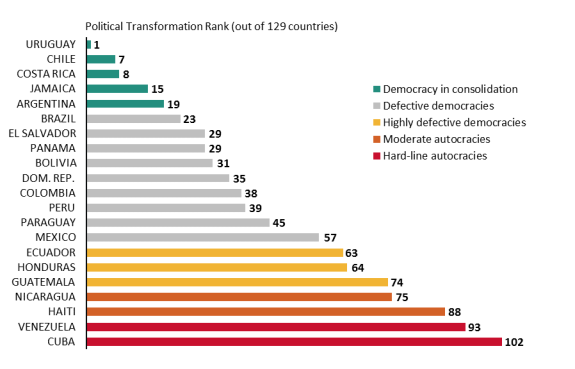 |
|
Source: Created by CRS Graphics using Bertelsmann Stiftung's 2018 Transformation Index. |
Figure 2 shows the global rank and classification of Central and South American and Caribbean countries according to the EIU's Democracy Index 2018.
|
Figure 2. EIU Democracy Index 2018 Global Ranking for |
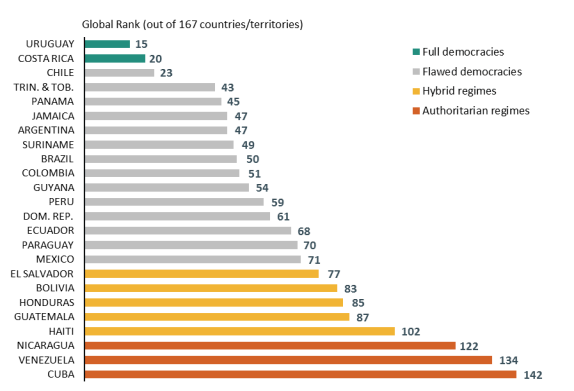 |
|
Source: Created by CRS Graphics using EIU's Democracy Index 2018. |
Figure 3 shows the aggregate scores of all Central and South American and Caribbean countries according to the Freedom House country web page for Freedom in the World 2019. Countries receive 0 to 4 points on 25 indicators (10 political rights indicators and 15 civil liberties indicators) for a total of up to 100 points.
|
Figure 3. Freedom House, Freedom in the World 2019 Aggregate Scores for |
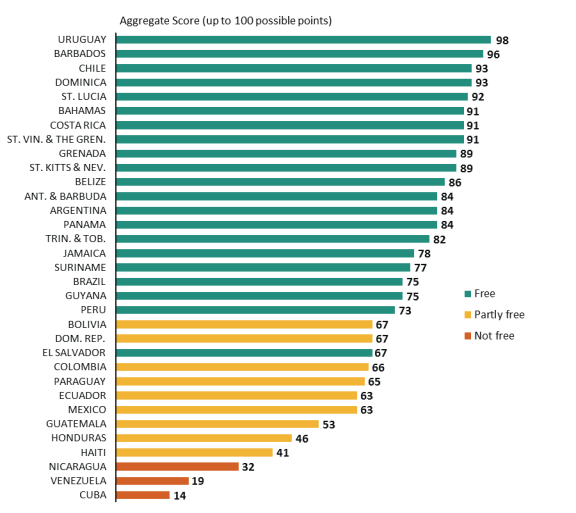 |
|
Source: Created by CRS Graphics using Freedom House's Freedom in the World 2019. |
Figure 4 shows the political rights and civil liberties scores of all Central and South American and Caribbean countries according to Freedom House's Freedom in the World 2019. The scale used is 1-7, with 1 indicating the most free conditions and 7 the least free.
Figure 5 shows the liberal democracy index rank and classification of all Central and South American and Caribbean countries according to the Varieties of Democracy Institute's Democracy Report 2019.
Table 4 provides resources for further information about democracy indicators in Central and South America and the Caribbean, although many cover other geographic areas as well. The sources are organized alphabetically by title. This is not an exhaustive list.
|
Title |
Organization |
Resource Type |
URL |
|
Bertelsmann Stiftung's Transformation Index |
Bertelsmann Stiftung |
Data on status index and governance index in table and graphic formats |
|
|
Bertelsmann Stiftung |
Regional report on Latin America and the Caribbean |
https://www.bti-project.org/en/key-findings/regional/latin-america-and-the-caribbean/ |
|
|
Bertelsmann Stiftung |
Reports on 129 countries, including 21 Latin American and Caribbean countries |
||
|
Democracy Report 2019 |
Varieties of Democracy (V-Dem) |
Report covers 179 countries |
|
|
Electoral Integrity Worldwide |
Electoral Integrity Project, an independent academic project based at Harvard University and the University of Sydney |
Report and data from cumulative study covering national presidential and parliamentary elections from July 1, 2012 to December 31, 2018 |
https://www.electoralintegrityproject.com/the-year-in-elections-2017 |
|
Freedom in the World 2019 |
Freedom House |
Report |
https://freedomhouse.org/sites/default/files/Feb2019_FH_FITW_2019_Report_ForWeb-compressed.pdf |
|
Freedom House |
Map |
https://freedomhouse.org/report/freedom-world/freedom-world-2019/map |
|
|
Freedom House |
Ranking list (includes more countries than report) |
https://freedomhouse.org/report/countries-world-freedom-2019?order=field_fiw_pr_rating&sort=asc |
|
|
Global State of Democracy Indices |
International Institute for Democracy and Electoral Assistance's (International IDEA) Global State of Democracy Initiative |
Interactive map looks at 97 indicators for 158 countries from 1975-2018 |
|
|
Global State of Democracy 2019 |
International Institute for Democracy and Electoral Assistance |
Report looks at global trends in democracy 1975-2015 |
|
|
Rule of Law Index 2019 |
World Justice Project |
Report measures how the rule of law is experienced and perceived in 126 countries |
|
|
World Justice Project |
Interactive map and data tables cover 126 countries |
||
|
WJP Mexico States Rule of Law Index 2018 |
World Justice Project |
A report on the adherence to the rule of law in Mexico's 32 states (also available in Spanish) |
https://worldjusticeproject.org/sites/default/files/documents/WJP-Mexico-States-Index-2018_0.pdf |
|
Worldwide Governance Indicators |
World Bank |
Data on 43 indicators of governance for 200+ countries from 1996-2017; in particular, see Voice and Accountability indicator |
Source: Compiled by the Congressional Research Service.
